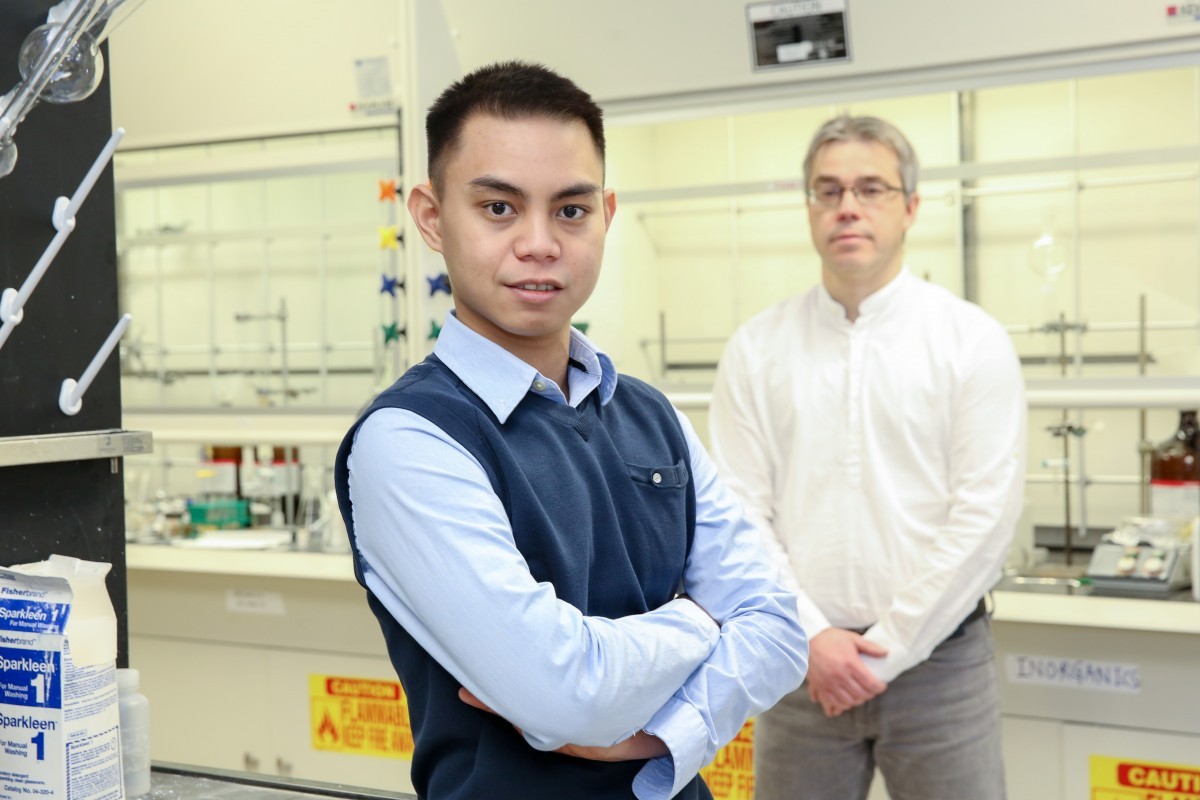
Ronald Domalaon is a graduate student working with Dr. Frank Schweizer, a leading researcher in the fields of medicinal chemistry and drug development. Photo courtesy of Mike Latschislaw.
Working hard to fight antibiotic resistance
According to the World Health Organization, antimicrobial resistance is a major global threat to public health. “Without urgent, coordinated action by many stakeholders, the world is headed for a post-antibiotic era, in which common infections and minor injuries which have been treatable for decades can once again kill,” said Dr. Keiji Kukuda, WHO’s Assistant Director-General for Health Security.
Ronald Domalaon is a graduate student working with Dr. Frank Schweizer, a leading researcher in the fields of medicinal chemistry and drug development. As part of a team of graduate students and postdoctoral fellows developing new approaches to combat antibiotic resistance, Domalaon understands the gravity of the work.
“It’s scary,” he says There are several bacterial strains that are resistant to almost all antibiotics or antibiotic classes we have in our arsenal. This affects our ability to fight infections; and what if you’re immunocompromised, what else can we do to save you?”
One method they are working on involves the fusion of two antibiotics, via covalent bond, to form a new hybrid antibiotic molecule. Covalent linkage of two matched antibacterial warheads reduces the likelihood for resistance development as it is expected to exhibit multiple modes of action, obtained from each parent drug. The resulting hybrid molecule may display improved antibacterial activity against drug-resistant bacterial strains. Domalaon reports that in vitro results are positive and encouraging. However, it will take several more years before this method can be tested in humans.
“Resistance has increasingly become a problem in recent years because the pace at which we are discovering new antibiotics has slowed drastically, while antibiotic use is rising.” http://amr-review.org/background
Child’s Play
Domalaon’s passion for medicinal chemistry was ignited early on. As a child he was frequently ill and often prescribed medicine. Domalaon wondered if he could also create medicine. Learning from doctors that most drugs came from nature was the catalyst for Domalaon’s interest in medicinal chemistry. Soon, he was grinding up all sorts of organic matter found in his backyard, creating various “medicinal substances” and proudly presenting them to the bemusement of his parents who worked in business not in science.
His desire to pursue chemistry grew as he progressed through school. He immigrated to Canada from the Philippines and attended his final year of high school at Murdoch MacKay Collegiate where his teachers strongly advised him to pursue science at the University of Manitoba.
Will and Determination
Domalaon excelled at university but struggled at first to understand research and wondered if he was cut out to be a scientist.
“Some people find it easy to get an A and don’t need to study as hard. I am not one of them, but I am a hardworking student.”
Determined to succeed, he sought help from his professors, studied diligently, read hundreds of research papers until they made sense, and soon his perseverance paid off.
While in university, he worked as an undergraduate laboratory teaching assistant, helping other students understand the wonders of chemistry in the laboratory. He was nominated by both his students and professors for his enthusiasm and knowledge, eventually receiving both the Department of Chemistry and the Faculty of Science Excellence in Teaching Assistance Awards for three consecutive years.
He also successfully applied for several undergraduate summer research awards through the Faculty of Science. That’s where he began working with Schweizer and found his passion for drug design and development through organic synthesis.
Undergraduate Research Success
After three years of hands-on undergraduate summer research with Schweizer, Domalaon published, as first listed author, his first international peer-reviewed publication: Domalaon R, Yang X, O’Neil J, Zhanel GG, Mookherjee N, Schweizer F .
In the spring of 2014, Domalaon graduated with a bachelor of chemistry, Biopharmaceutical Honours degree with a double minor in biological sciences and human nutrition and metabolism in the University of Manitoba.
“I decided to pursue a double-minor in biological sciences and human nutrition and metabolism because I wanted to better understand how the body reacts to and absorbs drugs, and I realized in my third year that knowing chemistry was not enough.”
That summer, he was invited to speak at the Canadian Society for Chemistry’s 97th Canadian Chemistry Conference and Exhibition in Vancouver, a rare opportunity for an undergraduate student. He took home first place for his oral presentation in the biological and medicinal chemistry division, competing among graduate students across Canada. Shortly afterwards, he was awarded a graduate studentship by the Manitoba Health Research Council (MHRC) to pursue his specialization in the field of antibacterial drug development here in Manitoba.
After he finishes his master of science, Domalaon aspires to a future career in the pharmaceutical industry where he hopes to make a meaningful contribution to the field of medicinal chemistry.
Advice to Students
Domalaon’s advice to undergraduate students:
“Apply for all available opportunities such as an undergraduate research; and if you’re granted the opportunity, work hard, persevere, own it, because everything you do in your undergraduate years matter.”
Links:
World Health Organization: WHO
2014 UK Report on Antibiotic Resistance
Research at the University of Manitoba is partially supported by funding from the Government of Canada Research Support Fund.






